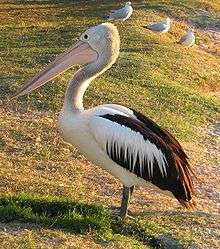pelican
See also: pélican
English

a pelican
Etymology
From Middle English pelican, pellican, pellicane, from Old English pellican (“pelican”), from Latin pelecānus, from Ancient Greek πελεκάν (pelekán), πέλεκυς (pélekus, “hatchet”).
Noun
pelican (plural pelicans)
- Any of various seabirds of the family Pelecanidae, having a long bill with a distendable pouch.
- A native or resident of the American state of Louisiana.
- (chemistry, obsolete) A retort or still having a curved tube or tubes leading back from the head to the body for continuous condensation and redistillation.
- (dentistry) A set of forceps used to force overcrowded teeth apart.
Derived terms
- pelican crossing
- pelican pot
- pelican spider
- pelicanist
- dental pelican
Translations
any of various seabirds of the family Pelecanidae
|
|
Occitan
Derived terms
- pelican australian
- pelican cresp
- pelican del Pero
- pelican ròsa
- pelican vulgar
Romanian
Alternative forms
- pelecan (dated)
Pronunciation
- IPA(key): /pe.liˈkan/
Declension
declension of pelican
Derived terms
- pelican comun
- pelican creț
- pelicanol
Related terms
- pelecaniforme
See also
- steganipod
References
- pelican in DEX online - Dicționare ale limbii române (Dictionaries of the Romanian language)
This article is issued from
Wiktionary.
The text is licensed under Creative
Commons - Attribution - Sharealike.
Additional terms may apply for the media files.